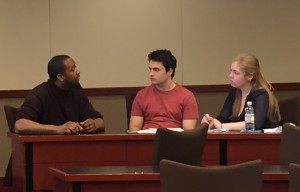
The barriers people face in gaining employment are as vast and varied as the people themselves. For some people, the barriers to getting hired are out of their control – like skin color, age, and mental health. For others, a lack of stability, income, and support make finding employment nearly impossible. Still for others, a previous drug or criminal record haunts individuals in their quest to build a better life. Finding work in D.C. often requires access to resources, networks, and connections that are not accessible to everyone. For many people in D.C., the job hunt can be a long, uncertain, and often ineffectual process.
“They don’t want anything to do with you”
Marie Wills remembers having to tell employers about her previous drug use. Wills talks about some employers’ assumptions about drug users.
“I’m still fairly new here”
Marie Wills discusses how being new to D.C. impacts her ability to find a job. Wills describes how she might be able to get her foot in the door if she had more access to networks, agencies, technology, or trade schools.
“No one got a job”
Robert Warren talks about the construction of Homeland Security. Warren discusses being denied jobs working on the construction of the building even though he was qualified.
“It’s like hitting your head against the wall”
Jacqueline Turner describes how age, money, and time are barriers to further employment and education. Turner talks about how difficult it is to progress in society without a degree.
“Age and appearance are factors in this town”
Jeff Taylor details the barriers he faces while seeking employment. Taylor maintains his age and appearance play a role in his employability.
“Bad Credit”
Steve Thomas recalls his experience applying for a job to distribute blankets to the homeless and being told he did not get the job because of his bad credit.
“A real professional town”
Kanie Pendarvis discusses how one must have at least an associate’s degree to work in D.C. Pendarvis describes how difficult it is to become employed without a utilities skill or a degree.
“Why is it they’re not employed?”
Jamal Francis talks about the level of unemployment for African American people in D.C. Francis says most of the jobs he is denied from are entry-level jobs.
“I’ve been cornered into entry-level jobs”
Jamal Francis describes how his lack of income prevented him from gaining employment. Francis talks about his difficulty finding entry-level employment despite his education.
“I never received a call back”
Jamal Francis discusses being denied jobs he felt qualified for. Francis believes that when he applies for jobs online, some employers discriminate against him because of his ethnic first name.
“They don’t look at me as a person now”
Paul Ellis details how his criminal record prevents him from gaining employment. Ellis describes how a past offense still hinders him today.
“They say, ‘Let me see your ID'”
David Chisolm talks about the obstacles he faces in obtaining identification. Chisolm discusses how difficult it is to become employed without an ID.
“Because of my life experiences”
Monseur Alli describes how his mental health, criminal record, and racial and religious identities prevent him from entering certain fields. Alli believes his life experiences hinders his ability to maintain employment.